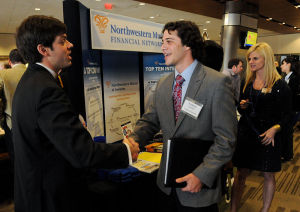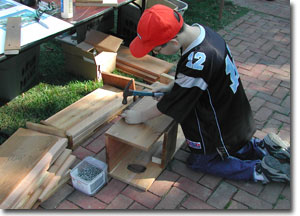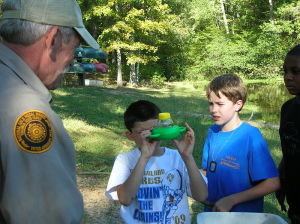There are no simple or easy answers as to how we find the career path that’s right for us. Some people manage to figure this out when they are younger. Most people stumble across what they should be doing through their life experiences. It is not always possible to figure this all out before making a career choice. Let me start by sharing a few observations before I launch into some tips that can help you out.

You can go through some rather deep reflection on all your experiences in life so far and use that to help you select something that may appear to be better for you. That doesn’t mean it will be the final or best answer. Sometimes, you move in a new direction which helps you to discover more about yourself. That process allows you to add to your list of what works for you and what doesn’t, what you enjoy and what you don’t.
I’ve had experiences where I thought I was doing what I loved only to learn after a few years that it really wasn’t right for me. Then I’ve been in a workplace where I was asked to take on a project or task outside of my normal job and discovered I loved doing that. So there is a mixture of experience, serendipity, reflection and more that all combine to help us edit out of our life what we don’t want and create more of what we do want.
As I look at my life today from the vantage point of being on this planet 65 years, something profound struck me. Nothing that I am doing today was a part of my plan, direction or interest when I was in my twenties to early thirties. Some of it didn’t emerge until I was in my fifties. I also know people who stayed in one career from college on but were never really happy with what they were doing.
They made really good money, got used to living a nice lifestyle and, over the years, assumed the responsibility for raising a family so they stuck with it. Some would pursue their real love like a hobby in their spare time. Others saved up enough money to leave what they were doing and focus on what they really wanted to do. So many different ways it can happen.
And then there is the opposite. In some cases, I know people who got a job that was okay but really had no idea what they liked or didn’t like. So they started out without having a passion for their work. Over time, they focused on mastering their job and being the best they could at it since that was how they brought home a paycheck. Funny thing happened. After a few years, they grew to love and enjoy what they were doing. There was no real selection process and in the early years the work didn’t excite them. When we truly excel at something to the point where we are better than most people who do that work and can feel a deep sense of accomplishment from it, we can sometimes come to really enjoy doing it.

As you can tell, there are a lot of different ways this all happens and there is no one right way. What’s important to understand here is this. Please take special note. No matter how much you want to think this out right now and make the perfect decision, there is no way you can force that to happen. It may happen and then again it may not. You have to be okay with that. You have to accept that you can engage this process of looking for what you want to do but how it plays out may not be the way you imagined. You do have to be open for the possibility that involving yourself in new experiences whether in a work environment or in your spare time may be critical for you to find the answers you seek. You simply have to be continually open to all the possibilities and learn more about yourself.
A Critical Career Question to Ask Yourself
One final and critical thought before looking at some ways to speed this along. One of the most important questions you can ever ask yourself is this: what would I love doing even if I wasn’t paid for it? Asking that question of yourself repeatedly over time will help you to discover what you enjoy doing most and what type of career that does pay money would be the most fulfilling to you.
Now let’s look at how we can apply all that I talk about on this page to help us make a better choice at career fork in the road. Yes, there are things you can do that will help this process as long as you accept that there are no magical steps to the answer you seek.
Review Your Life Experiences to Find A Better Career
We think we know ourselves yet too often we have not done sufficient reflection to extract all that we actually do know and can consciously view. The lessons that can tell us what we enjoy and don’t enjoy which could apply to a career choice often lie completely outside of our work experiences. Don’t limit your reflection process simply to the obvious work situations.
You need to make a long list of all the things in life you enjoy doing even if you don’t see a way you could make any money at it. It’s not about doing that in exactly that way. It’s about recognizing the more general process or activity and how that could be translated into work type activities. Or it could cause you to start looking at what careers might involve those types of things.
There is so much I learned about myself from the type of things I liked to do for play when I was child and the things that interested me in school. I also found that certain things adults did fascinated me where as others did not. If I identify what all of these personal experiences mean in terms of what I like and don’t like as well as what I’m good at and not good at, I can see all the things I currently love doing. They were there from childhood.

When I was a boy, I loved to build things. I would have my mom take me to the lumber yard to buy real construction lumber and adult tools then I would design my own structures and build them all by myself in the back yard. The lesson here was not about being in the construction industry or design field. It was about seeing the more general type of inclinations about what I naturally enjoyed doing. I like to create things from scratch. I like to work on my own and can work well without supervision. I like to develop things. I am very inventive and creative. I am good at seeing projects through to completion. I can visualize something and figuring out how to create it.
This is just one example. I can find many of the things I enjoy and don’t enjoy from my experiences growing up. There are other things I learned about myself from the jobs I did. Maybe the overall job wasn’t really exciting to me as a career but there was one thing I did for a few hours a week that I loved. So take apart every task and activity in the jobs you’ve held to extract those elements you did enjoy as well as the ones that clearly were not for you.
Look at the things you really like doing with your friends or by yourself. Step away from how those are labeled and look at the underlying process in doing it. Sometimes, you can find insights by taking all the things you enjoy and labeling them in a different way that might relate more to job task. These are called transfer skills and task because you are transferring their application from one type of activity to another.
This reflection is not just a weekend exercise. This is an on-going review process that will yield more and more insights over time. The more you focus on this, the more results it will return for you. Don’t be too quick to jump on something that seems great because you will discover more insights as time goes on.
Experiences Can Help Us Find the Right Career Path
There are many ways you can add experiences to your life outside of the job world that can help you learn more about yourself. Sometimes this is exactly what we need to do to help us find that fork in the road we are looking for.

You can join a club like Toastmasters to learn how to become a better speaker, communicator and leader. Yet there are many other experiences that you gain by being a member of such a club which may help you find things you enjoy that you were not aware of. It might be in the type of social interaction or thinking on your feet or working behind the scenes to help the club out or leading new club project.
There are all types of clubs and organizations that can offer you wonderful experiences. There are also informal groups that center on common interest you could join from drumming circles to wine tasting to book discussions to hiking to travel and so on. Whatever you might have an interest in, there is a group or organization somewhere about it. And when you get involved in something you have an interest in, you may end up doing things that help you discover what you really want to be doing career wise.
You can do some volunteer work. There are all types of community organizations that need help. The activities you get involved with helping out may help you discover more about yourself. This could also be true volunteering to help out at a school or a youth sporting activity or becoming a guide at a museum. There are literally hundreds of such opportunities out there where you can become involved.
Read Like Crazy
Expand what you are reading beyond the topics you now read primarily in the non-fiction area. Though, you might want to read some fiction too since there could be something about that which helps you identify what you would enjoy. You just never know. The more knowledge about different things, interest, organizations, successful people, occupations and more that you expose yourself to, the more your mind can work on your behalf to connect the dots.
Skills and Tools to Find A Better Career
As you may realize by this point, exposing yourself to new things whether through experience, reading or watching videos expands your awareness about yourself. It gives you significantly more information to help you identity all that you truly enjoy doing and what types of occupations might involve doing those types of task.

The process for learning more about ourselves and connecting that to how we engage the world involves several skills, techniques and tools. The better you are at using these and the more frequently you use these, the more likely you are to discover what you should be doing with your life. That discovery might not occur today or tomorrow. It might be a month from now, a year from now or a decade from now. If you use what you learn to make new choices, try new things, and experiment with new pursuits, you will speed up your discovery of what you like and don’t like and what you’re good at and what you’re not. This journey will help you to continue editing the path you follow as you move more toward what is best for you.
Expand awareness
Creative thinking
Analytical and critical thinking
Reflection
Openness and listening
Experimentation
Patience
Persistence
Following our inner wisdom
Faith
The best career choice is not normally a big dramatic decision that is made at a single point in time and then set in stone. It is a series of choices big and small made over a long period of time using all these skills, techniques and tools. Life is a journey, not a destination.




14 thoughts on “Find A Career You Love”
wu729z
l9q6g4
nyqypl
jljyxm
qr2d9b
zn79zv
1lqja0
n7pn14
vphz9j
dyyy72
213r7t
u550yi
o6q12n
fmflxa